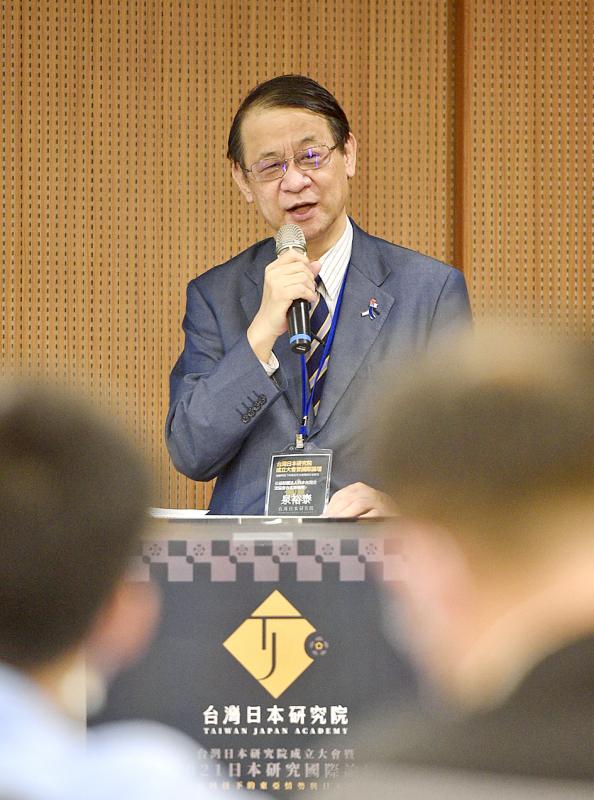Democratic Progressive Party Legislator Kuo Kuo-wen (郭國文) yesterday called on Japan to introduce a “Japanese version of the [US’] Taiwan Travel Act” to facilitate mutual visits by senior officials from both countries.
Kuo, who heads the legislature’s friendship association for East Asia, made the remark at the launch ceremony of the Taiwan Japan Academy at National Chengchi University in Taipei, attended by experts and academics urging stronger Taiwan-Japan ties.
Kuo said that the nation should support Taiwan-friendly Japanese lawmakers who are pushing for a mechanism that would allow official visits.

Photo: George Tsorng, Taipei Times
The friendship between Taiwan and Japan is strong, and the two peoples have come to each other’s aid in the wake of natural disasters, he said.
Former president Lee Teng-hui’s (李登輝) approach to the ties had led to structural changes, he said.
Kuo said he hopes that Japan’s ruling Liberal Democratic Party, which is traditionally Taiwan-friendly, would continue this path. Japanese Prime Minister Yoshihide Suga and members of his Cabinet have repeatedly emphasized the importance of Taiwan’s security, which suggests a shift in Tokyo’s approach to cross-strait affairs, he said.
When then-US president Bill Clinton in 1996 asked Tokyo to revise the US-Japan Treaty of Mutual Cooperation and Security, the discourse in Tokyo revolved around “the situation in the surrounding area,” he said.
That the Suga administration bolstered its geostrategic policy shows that a different school of thought now prevails in Japan’s national security establishment, he said.
Japan-Taiwan Exchange Association Representative Hiroyasu Izumi said Japan hopes that the academy would help bolster rapport and understanding between the two sides, adding that knowledge of Japan would become an asset in Taiwan.
The two countries’ relationship is based on mutual goodwill and sympathy, as demonstrated after the 2011 Tohoku earthquake and tsunami, as well as during the COVID-19 pandemic, he said.
The passing of an old generation of Japanese-speaking Taiwanese — such as Lee, who made great contributions to the bilateral relationship — has made the academy’s work more important than ever, he said.
Taiwan and Japan have technology advantages that could complement each other in ways that could contribute to world peace and prosperity, he added.

CALL FOR SUPPORT: President William Lai called on lawmakers across party lines to ensure the livelihood of Taiwanese and that national security is protected President William Lai (賴清德) yesterday called for bipartisan support for Taiwan’s investment in self-defense capabilities at the christening and launch of two coast guard vessels at CSBC Corp, Taiwan’s (台灣國際造船) shipyard in Kaohsiung. The Taipei (台北) is the fourth and final ship of the Chiayi-class offshore patrol vessels, and the Siraya (西拉雅) is the Coast Guard Administration’s (CGA) first-ever ocean patrol vessel, the government said. The Taipei is the fourth and final ship of the Chiayi-class offshore patrol vessels with a displacement of about 4,000 tonnes, Lai said. This ship class was ordered as a result of former president Tsai Ing-wen’s (蔡英文) 2018

UKRAINE, NVIDIA: The US leader said the subject of Russia’s war had come up ‘very strongly,’ while Jenson Huang was hoping that the conversation was good Chinese President Xi Jinping (習近平) and US President Donald Trump had differing takes following their meeting in Busan, South Korea, yesterday. Xi said that the two sides should complete follow-up work as soon as possible to deliver tangible results that would provide “peace of mind” to China, the US and the rest of the world, while Trump hailed the “great success” of the talks. The two discussed trade, including a deal to reduce tariffs slapped on China for its role in the fentanyl trade, as well as cooperation in ending the war in Ukraine, among other issues, but they did not mention

HOTEL HIRING: An official said that hoteliers could begin hiring migrant workers next year, but must adhere to a rule requiring a NT$2,000 salary hike for Taiwanese The government is to allow the hospitality industry to recruit mid-level migrant workers for housekeeping and three other lines of work after the Executive Yuan yesterday approved a proposal by the Ministry of Labor. A shortage of workers at hotels and accommodation facilities was discussed at a meeting of the legislature’s Transportation Committee. A 2023 survey conducted by the Tourism Administration found that Taiwan’s lodging industry was short of about 6,600 housekeeping and cleaning workers, the agency said in a report to the committee. The shortage of workers in the industry is being studied, the report said. Hotel and Lodging Division Deputy Director Cheng

‘SECRETS’: While saying China would not attack during his presidency, Donald Trump declined to say how Washington would respond if Beijing were to take military action US President Donald Trump said that China would not take military action against Taiwan while he is president, as the Chinese leaders “know the consequences.” Trump made the statement during an interview on CBS’ 60 Minutes program that aired on Sunday, a few days after his meeting with Chinese President Xi Jinping (習近平) in South Korea. “He [Xi] has openly said, and his people have openly said at meetings, ‘we would never do anything while President Trump is president,’ because they know the consequences,” Trump said in the interview. However, he repeatedly declined to say exactly how Washington would respond in